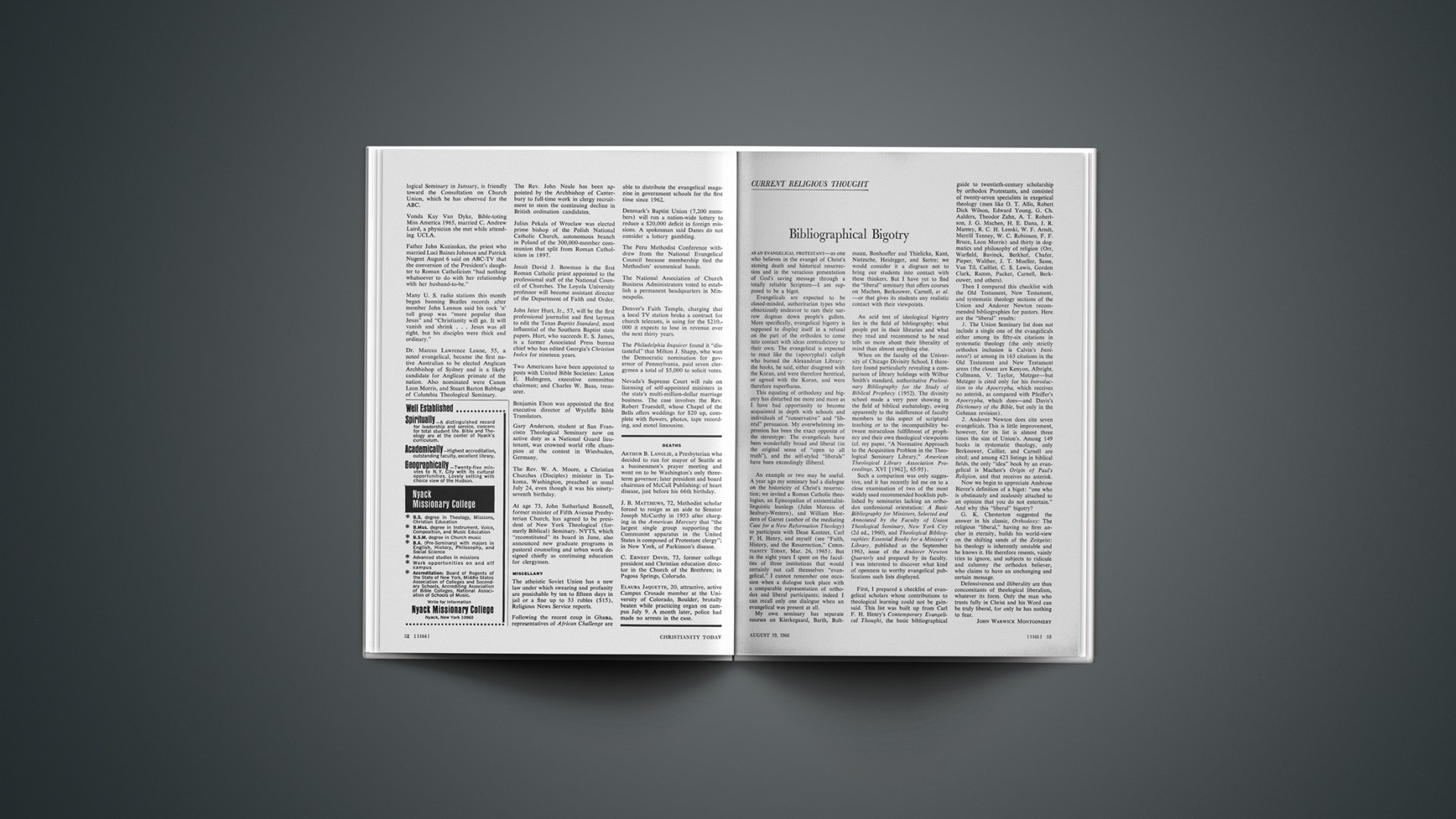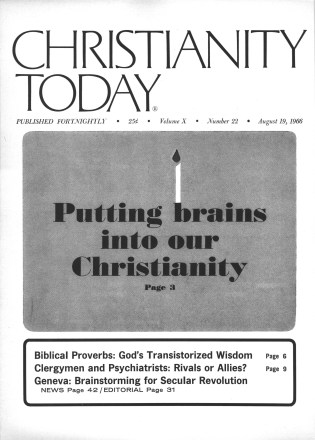As an evangelical protestant—as one who believes in the evangel of Christ’s atoning death and historical resurrection and in the veracious presentation of God’s saving message through a totally reliable Scripture—I am supposed to be a bigot.
Evangelicals are expected to be closed-minded, authoritarian types who obnoxiously endeavor to ram their narrow dogmas down people’s gullets. More specifically, evangelical bigotry is supposed to display itself in a refusal on the part of the orthodox to come into contact with ideas contradictory to their own. The evangelical is expected to react like the (apocryphal) caliph who burned the Alexandrian Library: the books, he said, either disagreed with the Koran, and were therefore heretical, or agreed with the Koran, and were therefore superfluous.
This equating of orthodoxy and bigotry has disturbed me more and more as I have had opportunity to become acquainted in depth with schools and individuals of “conservative” and “liberal” persuasion. My overwhelming impression has been the exact opposite of the stereotype: The evangelicals have been wonderfully broad and liberal (in the original sense of “open to all truth”), and the self-styled “liberals” have been exceedingly illiberal.
An example or two may be useful. A year ago my seminary had a dialogue on the historicity of Christ’s resurrection; we invited a Roman Catholic theologian, an Episcopalian of existentialist-linguistic leanings (Jules Moreau of Seabury-Western), and William Hordern of Garret (author of the mediating Case for a New Reformation Theology) to participate with Dean Kantzer, Carl F. H. Henry, and myself (see “Faith, History, and the Resurrection,” CHRISTIANITY TODAY, Mar. 26, 1965). But in the eight years I spent on the faculties of three institutions that would certainly not call themselves “evangelical,” I cannot remember one occasion when a dialogue took place with a comparable representation of orthodox and liberal participants; indeed I can recall only one dialogue when an evangelical was present at all.
My own seminary has separate courses on Kierkegaard, Barth, Bult-mann, Bonhoeffer and Thielicke, Kant, Nietzsche, Heidegger, and Sartre; we would consider it a disgrace not to bring our students into contact with these thinkers. But I have yet to find the “liberal” seminary that offers courses on Machen, Berkouwer, Carnell, et al.—or that gives its students any realistic contact with their viewpoints.
An acid test of ideological bigotry lies in the field of bibliography; what people put in their libraries and what they read and recommend to be read tells us more about their liberality of mind than almost anything else.
When on the faculty of the University of Chicago Divinity School, I therefore found particularly revealing a comparison of library holdings with Wilbur Smith’s standard, authoritative Preliminary Bibliography for the Study of Biblical Prophecy (1952). The divinity school made a very poor showing in the field of biblical eschatology, owing apparently to the indifference of faculty members to this aspect of scriptural teaching or to the incompatibility between miraculous fulfillment of prophecy and their own theological viewpoints (cf. my paper, “A Normative Approach to the Acquisition Problem in the Theological Seminary Library,” American Theological Library Association Proceedings, XVI [1962], 65–95).
Such a comparison was only suggestive, and it has recently led me on to a close examination of two of the most widely used recommended booklists published by seminaries lacking an orthodox confessional orientation: A Basic Bibliography for Ministers, Selected and Annotated by the Faculty of Union Theological Seminary, New York City (2d ed., 1960), and Theological Bibliographies: Essential Books for a Minister’s Library, published as the September 1963, issue of the Andover Newton Quarterly and prepared by its faculty. I was interested to discover what kind of openness to worthy evangelical publications such lists displayed.
First, I prepared a checklist of evangelical scholars whose contributions to theological learning could not be gainsaid. This list was built up from Carl F. H. Henry’s Contemporary Evangelical Thought, the basic bibliographical guide to twentieth-century scholarship by orthodox Protestants, and consisted of twenty-seven specialists in exegetical theology (men like O.T. Allis, Robert Dick Wilson, Edward Young, G. Ch. Aalders, Theodor Zahn, A. T. Robertson, J. G. Machen, H. E. Dana, J. R. Mantey, R. C. H. Lenski, W. F. Arndt, Merrill Tenney, W. C. Robinson, F. F. Bruce, Leon Morris) and thirty in dogmatics and philosophy of religion (Orr, Warfield, Bavinck, Berkhof, Chafer, Pieper, Walther, J. T. Mueller, Sasse, Van Til, Cailliet, C. S. Lewis, Gordon Clark, Ramm, Packer, Carnell, Berkouwer, and others).
Then I compared this checklist with the Old Testament, New Testament, and systematic theology sections of the Union and Andover Newton recommended bibliographies for pastors. Here are the “liberal” results:
1. The Union Seminary list does not include a single one of the evangelicals either among its fifty-six citations in systematic theology (the only strictly orthodox inclusion is Calvin’s Institutes!) or among its 163 citations in the Old Testament and New Testament areas (the closest are Kenyon, Albright, Cullmann, V. Taylor, Metzger—but Metzger is cited only for his Introduction to the Apocrypha, which receives no asterisk, as compared with Pfeiffer’s Apocrypha, which does—and Davis’s Dictionary of the Bible, but only in the Gehman revision).
2. Andover Newton does cite seven evangelicals. This is little improvement, however, for its list is almost three times the size of Union’s. Among 149 books in systematic theology, only Berkouwer, Cailliet, and Carnell are cited; and among 423 listings in biblical fields, the only “idea” book by an evangelical is Machen’s Origin of Paul’s Religion, and that receives no asterisk.
Now we begin to appreciate Ambrose Bierce’s definition of a bigot: “one who is obstinately and zealously attached to an opinion that you do not entertain.” And why this “liberal” bigotry?
G. K. Chesterton suggested the answer in his classic, Orthodoxy: The religious “liberal,” having no firm anchor in eternity, builds his world-view on the shifting sands of the Zeitgeist; his theology is inherently unstable and he knows it. He therefore resents, vainly tries to ignore, and subjects to ridicule and calumny the orthodox believer, who claims to have an unchanging and certain message.
Defensiveness and illiberality are thus concomitants of theological liberalism, whatever its form. Only the man who trusts fully in Christ and his Word can be truly liberal, for only he has nothing to fear.










